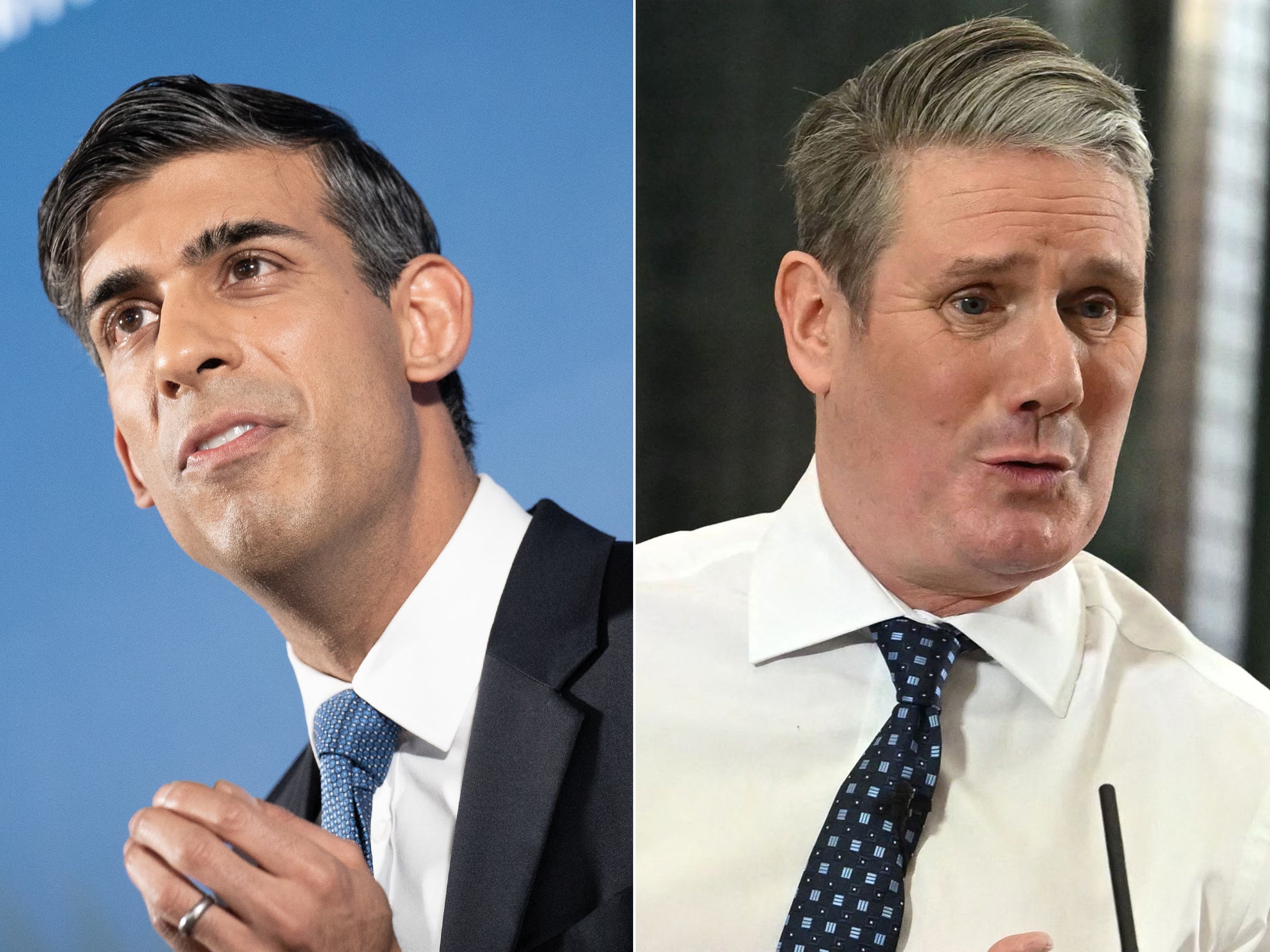Rishi Sunak and Keir Starmer are stealing clothes from the other’s party
Both leaders are lurching to the centre, telling voters they have seen off extreme, unpopular predecessors on the left and right respectively, writes Andrew Grice


How is this different to what the government is proposing?” said a question-and-answer briefing note for Labour MPs on how to answer the media’s questions about Keir Starmer’s new year speech.
That the question was anticipated was revealing. The leaders of the two main parties are both lurching to the centre, telling voters they have seen off extreme, unpopular predecessors on the left and right respectively.
Starmer can prosecute this case more convincingly: he has buried Jeremy Corbyn and is now doing the same to Corbynism. Rishi Sunak’s deliberately limited promises aimed at regaining voters’ trust are his antidote to the bombast and over-promising of Boris Johnson and the naive recklessness of Liz Truss.
It’s easier for the Labour leader than the prime minister to demonstrate he has taken back control of his party. Sunak must be less explicit than Starmer; Johnson and Truss allies are always waiting to pounce and are already criticising him. Nadine Dorries has given us a flavour of what is to come, claiming three years of progressive Tory government is “being washed down the drain”.
Dangerously for Sunak, the Johnson and Truss brigades will claim he is not doing enough to secure economic growth.
Sunak would surely like to be bolder but that would risk advertising his weak position. His realism and honesty do not extend to admitting in public the increasingly obvious economic pain caused by Johnson’s threadbare Brexit deal. That would provoke hardline Brexiteers.
The two leaders are stealing clothes from the other’s party. Sunak’s speech adopted Tony Blair’s “five pledges” strategy and his commitment to “the people’s priorities”. Starmer wrapping himself in the “take back control” flag was clever: it’s the first time anyone has made devolving power from central government sexy. Acknowledging the (unfulfilled) demand of Leave voters will help Starmer in the red wall.
Although the devolution plan was proposed by Gordon Brown last month, Starmer did not mention Brown’s plan to abolish the House of Lords and some Labour insiders suggest Starmer has got a bit of “buyer’s remorse” over putting it in lights.
Starmer’s speech also gave us the first glimpse of how he will make Labour’s offer: the building blocks will be “national missions” to be set out in the coming weeks. Aides say Starmer won’t display all his policies “in the shop window” yet; they will come in stages as the party’s manifesto is built around the “missions”. He hopes these goals will become “the driving force” of his government and answer the voters’ crucial question: how will make our lives better?
Some Labour figures worry that devolving power is not a “real world” issue. But Starmer sees it as the key to creating growth, as well as Labour’s prescription for levelling up. The internal document says the party’s industrial strategy will move beyond “unsustainable state subsidies for inefficient incumbents with good political connections” to include “everyday economy” sectors like social care and retail.
I thought Starmer’s speech was more substantive than Sunak’s. Some Tories privately regretted that Sunak did not address head-on the real world of strikes and an NHS in crisis. One MP told me: “He wanted to be upbeat, but I think the public wanted to hear more clearly that he understands what they are going through.” Sunak’s potential Achilles heel is not that he is rich but that he looks out of touch.
True, Sunak must suggest the current problems are as not quite as bad as they look and offer hope they can be turned around by his steady hand on the tiller. He does not want to attack his own party’s record in 13 years in power, which would provoke a Tory civil war and underline Labour’s “time for change” message. Conversely, it is much easier for an opposition leader to highlight the state the country is in and Starmer’s attack on the Tories’ “sticking-plaster solutions” will strike a chord.
While it is Sunak who needs to find a game-changer, Starmer cannot afford to tread water in the hope the Tories sink. They might recover as Sunak shows progress towards his limited goals. The Labour leader needs to turn his warm words into policies that survive contact with the cold light of day. Some difficult choices loom. Will he keep Labour’s 2019 pledge to scrap university tuition fees at a cost of £9.5bn a year?
How will Rachel Reeves’ promise to spend £28bn a year for 10 years on a green energy revolution fit with the party’s tough fiscal rules? There’s a battle over that behind the scenes. Ed Miliband, the shadow climate change secretary, argues that the pledge must be sacrosanct. Some shadow cabinet members disagree.
This week’s result: Sunak 1, Starmer 2. But with a general election unlikely before the autumn of 2024, it was only the first match in what is going to be a very long season.






Join our commenting forum
Join thought-provoking conversations, follow other Independent readers and see their replies
0Comments